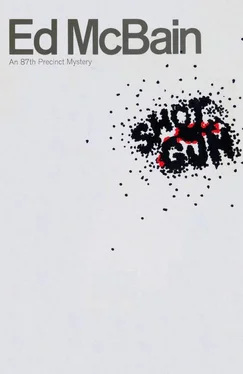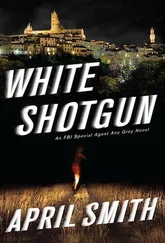“And that was the last time you saw him?”
“Yes. When he got out of the car.”
“Have you seen him since?”
“No.”
“Talked to him?”
“No.”
“He hasn’t called you?”
“No, he hasn’t.”
“Have you called him?”
“He hasn’t got a phone.” Mandy paused. “Well, I did call the club, but they said he hasn’t been to work all week. So I thought I’d stop by the apartment this afternoon to see if anything was wrong.”
“Ever hear him mention some people named Leyden?”
“Layton? No.”
“Leyden. L-E-Y-D-E-N.”
“No, never.”
“Did he have anything with him when you left the apartment?”
“Like what?”
“Well, you tell us.”
“Yes, but I don’t know what you mean.”
“Was he carrying a gun?”
“I don’t think so. But I know he has a gun. A little pistol.”
“This would have been a big gun, Miss Pope—”
“Mandy.”
“... Mandy. You couldn’t have missed it.”
“I still don’t understand.”
“Miss Pope, was he carrying a shotgun?”
“A shotgun? No. Of course not. Why would he—?”
“Do you know what a shotgun looks like?”
“Well, no, but... well, yes, it’s like a rifle, isn’t it?”
“Somewhat.”
“No, I would have noticed something like that.”
“Was he carrying any sort of a large—”
“No.”
“... anything that could have been a shotgun wrapped up, or in a case—”
“No, he wasn’t carrying anything.”
“Mmm,” Carella said.
“Why would he take a gun to a poker game?” Mandy asked, and looked up at the cops.
“Maybe he wasn’t going to a poker game, Miss Pope.”
“Mandy.”
“Maybe he was going uptown to kill some people.”
“Oh, no.”
“Some people named Rose and Andrew Leyden.”
“No,” Mandy said again.
“You’re sure you haven’t seen him since last Friday night?”
“Yes. And that’s not like Wally, believe me. He’ll usually call me three, four times a week.”
“But this week he hasn’t called you at all?”
“Not once.”
“Did he mention anything about going out of town?”
“Where would he go?”
“You tell us.”
“No place. He has a job here. Why would he leave town?”
“If he killed some people, he might have decided it was best to leave town.”
“Well, I’m sure he didn’t kill anyone.”
“Did you ever go out of town with him?”
“No.”
“Know if he has any relatives outside the city?”
“I don’t know. He never mentioned any.”
“Miss Pope, if you—”
“Mandy.”
“... hear from Damascus, I want you to call this squadroom at once. I’m warning you now that he’s suspected of having committed multiple homicide, and if you know of his whereabouts now—”
“I don’t.”
“... or learn of them at any time in the future, and withhold this information from the police, you would then be considered an accessory.”
“Oh, I’m sure Wally hasn’t killed anyone,” Mandy said.
“An accessory as described in Section 2 of the Penal Law, Miss Pope... Mandy... ‘is a person who, after the commission of a felony, harbors, conceals, or aids the offender, with intent that he may avoid or escape from arrest, trial, conviction, or punishment, having knowledge or reasonable ground to believe that such offender is liable to arrest.’ Do you understand that?”
“Yes, I do. But Wally—”
“We’ve just told you that if we find him we’re going to arrest him, so you now have knowledge of that fact,” Brown said, and paused. “Do you know where he is?”
“No, I’m sorry. I don’t.”
“Will you call us if you hear from him?”
“Yes, of course I will. But you’re really mistaken. Wally couldn’t have killed anyone.”
“All right, Miss Pope, you’re free to go now, Mandy,” Carella said.
“Show her out, somebody,” Kling said.
Brown showed her out.
Everybody likes to spend Saturday in a different way.
Meyer and Hawes went to a poetry reading, Carella got hit on the head, and Bert Kling got beat up.
It was a nice Saturday.
The poetry reading was scheduled to start at 11:00 A.M. in the YMCA on Butler Street, but it did not actually get underway until 11:15, at which time a portly young man wearing muttonchop whiskers and a brown tweed suit stepped through the curtains and told the assembled crowd — some fifty people in all — that this was to be, as they all knew, a memorial service for Marguerite Ryder, who had been buried yesterday. The portly young man then went on to say that ten of Margie’s closest friends and fellow poets had written elegies for her, and that they would be read by their authors this morning accompanied by the guitarist, Luis-Josafat Garzon. The portly young man then introduced Garzon, a sallow-faced gentleman wearing a dark-gray suit. Garzon solemnly sat on a black stool stage left, and the curtains opened, and the first poet stepped forward and began reading his tribute to the dead woman.
There was a curious mixture of mourning and celebration in that auditorium, an air of grief commingled with the excitement one might expect at a Broadway opening. The first poet read his work with dramatic fervor, as though hoping David Merrick was sitting in the audience with an offer to do a one-man show. In his poem, he compared Margie Ryder to a sparrow innocently striking an unexpected obstacle that had broken her body and snuffed out her life, “to fly no more,” he intoned, “to fly no more, except in boundless dreams, eternal dreams.” He lowered his manuscript, his head, and his eyes. There was a brief silence, and Meyer fully expected everyone to begin applauding, thankful when they had the good grace not to. The second poet had titled his poem “Voice,” and in it he told of an incredibly lovely voice that had been stilled.
“Shout,” he shouted, “scream against this indecency,
“Raise your voice to raise the voice
“Robbed by the obscene steel of death!
“For oh, there was beauty here,
“There was depth and beauty enough
“To fill a garden,
“A forest,
“A world.
“Oh, Marge, we cry,
“We cry out!
“Our voices rise in tumultuous grievance!
“Hopefully you will hear and know, hear and know,
“Oh Marge.”
There was another silence. Hawes wanted to blow his nose, but was afraid to do so. Luis-Josafat Garzon played a brief, lugubrious guitar passage to cover the tardy entrance of the third poet, a tall gaunt young man wearing a beard and sunglasses. His poem, Hawes felt, was a trifle derivative, but the audience listened respectfully nonetheless, and there was even the sound of tears throughout the reading.
“It was only a week or so ago,
“As I sat sipping my cider,
“That a woman was killed whom you may know,
“By the name of Marguerite Ryder.
“And this woman she lived with no other thought
“Than to give to the humans beside her.”
Hawes looked at Meyer, and Meyer looked at Hawes, and the gaunt, bearded, sunglassed poet began reading the second stanza.
“She was a child, yes only a child,
“In a tenement garden of dreams,
“And the love that she gave, was a love more than love,
“But it ended in futile screams.
“Someone tore her apart, someone stepped on her heart,
Читать дальше












